News
Auschwitz ‘must be experienced’
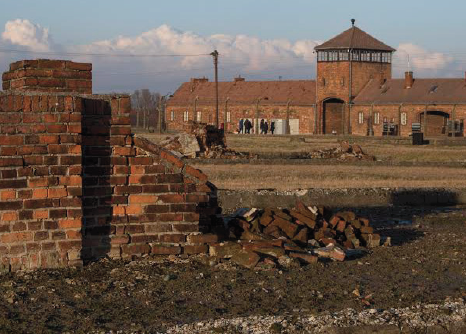
 AROUND 200 students from schools and colleges across Wales have visited the Nazi concentration and death camp Auschwitz- Birkenau in Poland as part of the Holocaust Educational Trust’s Lessons from Auschwitz Project.
AROUND 200 students from schools and colleges across Wales have visited the Nazi concentration and death camp Auschwitz- Birkenau in Poland as part of the Holocaust Educational Trust’s Lessons from Auschwitz Project.
Now in its seventeenth year, the project is based on the premise that ‘hearing is not like seeing’.
On the visit, students first visited Oswiecim, the town where the Nazi concentration and death camp was located and where, before the war, 58% of the population was Jewish.
Before visiting the concentration camp, students were taken to a Jewish Cemetery in the town of Oswiecim.
The Town’s last known Jewish person passed away in 2000 and a central grave was built for this person.
However, pupils learned that the gravestones did not necessarily correspond with the deceased because these were replacements after Nazis dug up the original gravestones to use them to build roads.
Students then visited Auschwitz I to see the former camp’s barracks and crematoria and witnessed the piles of belongings that were seized by the Nazis.
Among the belongings were numerous pots and pans, shoes, brushes and suitcases.
Pictures of the prisoners held at the camp were also displayed in numerous buildings.
They were given a guided tour of the facilities and also shown were the Jewish people were taken to be gassed.
The gas chamber was created at Auschwitz I in late 1941 but in 1942 killing operations largely moved to Birkenau where two gas chambers were created in specially adapted cottages near the camp.
Finally they spent time at the main killing centre of Birkenau where the day concluded with candle lighting and a period of reflection to remember the six – million Jews killed in the Holocaust and the other victims of Nazi persecution.
The visit to Auschwitz-Birkenau was preceded by a seminar in the UK where participants were introduced to Jewish life in Europe before the Second World War and heard the testimony of a Holocaust survivor.
The overall number of people murdered at Auschwitz-Birkenau is estimated to be approximately 1.1 million people. They included: around 1 million Jews; around 64,000 Poles; around 21,000 Sinti and Roma; around 15,000 Soviet POWs and around 12,000 victims from other groups.
Other prisoners died from disease, starvation, exhaustion or brutal treatment by guards.
The students will now become ambassadors for the Holocaust Educational Trust and will undertake their ‘next steps’ to share their experience with their schools and their wider community.
Karen Pollock MBE, Chief Executive of the Holocaust Educational Trust said: “The Lessons from Auschwitz Project is a vital part of our work, allowing young people to learn about the Holocaust in a way they cannot in the classroom.
“The visit enables young people to see for themselves where racism, prejudice and antisemitism can ultimately lead and its importance is demonstrated by the inspiring work students go on to do in their local communities.”
Pupils from Greenhill School in Tenby and Ysgol y Preseli were among the representatives from Pembrokeshire on the trip.
Students described the experience as ‘surreal’ and added that they were shocked by the number of personal belongings that were on display at the museum.
One of the students commented: “The day was extremely tiring, both physically and emotionally.
“It was highly moving to see such genuine, re-humanisation of the victims
“One of the most educational days of my life, almost too much to absorb in such a short period of time.
“The experience at Birkenau was indescribable, and different to anything I have ever experienced. The atmosphere of the camp was heavy with tragedy. The size and scale of the place cannot be justified by words, it must be experienced.
“The ceremony, hosted by the Rabbi Marcus was invaluable to the experience as it gave a chance for much needed reflection and also the chance to get a deeper insight of the thoughts and feelings of the contemporary Jewish population.”
Another student commented: “Visiting Auschwitz 1 and Auschwitz-Birkenau was such a surreal experience. Actually visiting the camps made everything more real than seeing the images on line. It was shocking to see the personal belongings in Auschwitz 1 where everything was kept behind glass.
“There were two sides of a hallway full of shoes – this made me think of how many were actually brought to these camps and had their innocent lives taken away from them for no apparent reason. Five minutes away was Birkenau, the death camp of wooden barracks – although many had been torn down by now.
“The living conditions in this camp were disgusting and brutal. To think people were made to live like this is totally beyond me and I dare even to think why something as horrible as this ever happened to begin with. 6 million murdered in the Holocaust – people with families and friends and lives, they had it all taken away from them by other human beings. It makes me wonder if humanity could go any lower.”
Community
St David’s Day parade brings colour and celebration to Haverfordwest
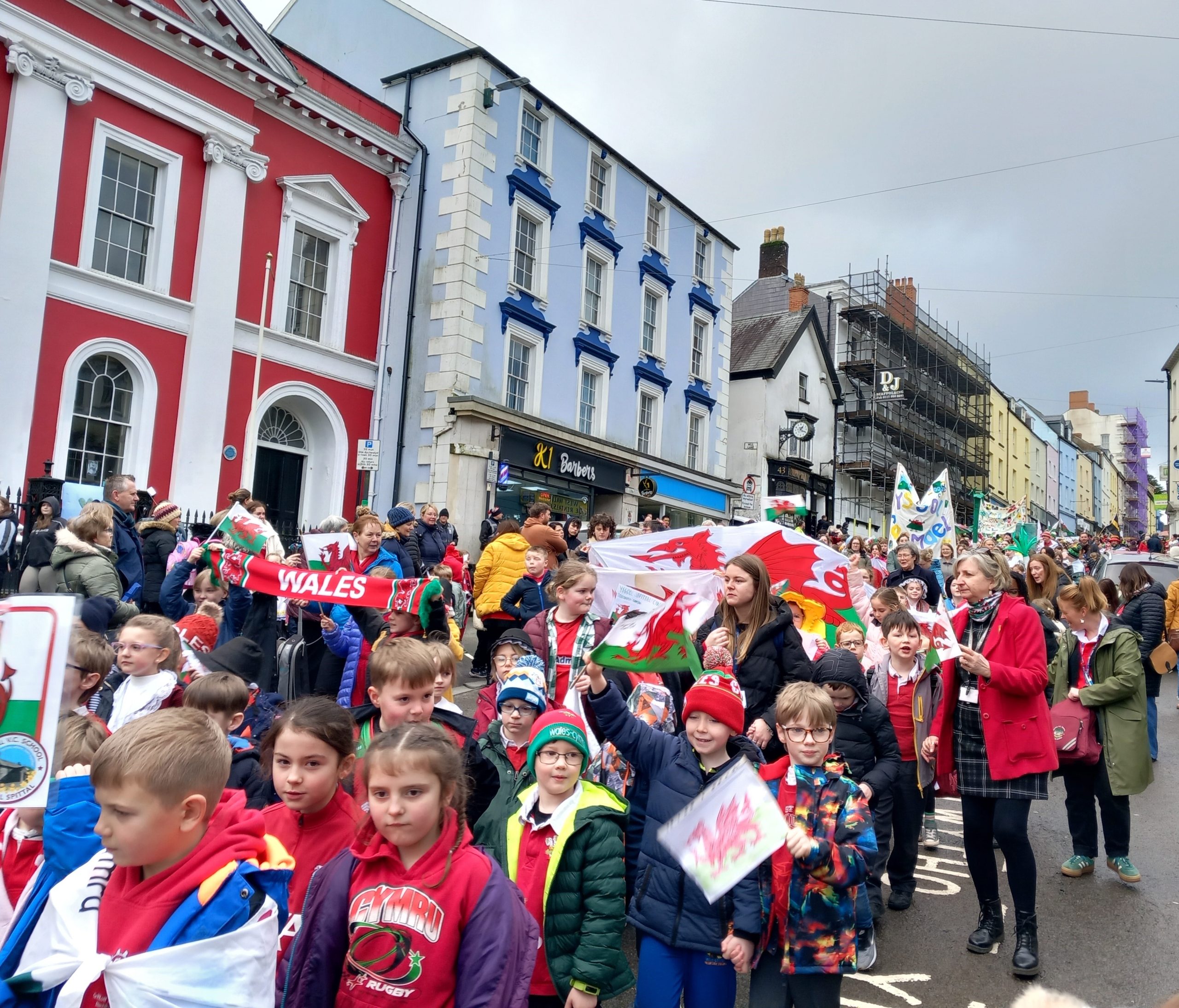
HAVERFORDWEST town centre was a hive of activity today (Friday, Feb 27) as hundreds of children from schools across Pembrokeshire took part in a special St David’s Day celebration.
The popular parade, organised by the Pembrokeshire Language Forum, returned to the county town once again, with smiles all round from participants and spectators who lined the streets to watch.
Children paraded down High Street, through Bridge Street and along Quay Street, led by Samba Doc, before gathering at Picton Playing Fields for songs and dancing during an open-air jamboree with entertainer Tomos Tanllyd.
Pembrokeshire County Council Leader Cllr Jon Harvey said: “St David’s Day is always a special occasion in Pembrokeshire, and it was wonderful to see so many young people coming together to celebrate our language, culture and national identity.”
Cabinet Member for Education and the Welsh Language, Cllr Guy Woodham added: “The annual St David’s Day parade is a shining example of what schools in Pembrokeshire do to celebrate the Welsh language and culture, and they are certainly enthusiastic about it.”
Council Vice Chairman and Champion for the Welsh Language and Children and Young People, Cllr Delme Harries said: “It was fantastic to see such enthusiasm from pupils across the county, proudly celebrating St David’s Day.”
Local member Cllr Tom Tudor also praised the event, adding: “It really was a great celebration of St David’s Day and a highlight for Haverfordwest.”
Welsh Language Development Officer Catrin Phillips said the event continues to grow each year.
She said: “The St David’s Day parade, organised by the Pembrokeshire Language Forum, is always a highlight of the year and it’s wonderful to bring schools together to celebrate Welsh language and culture in such a joyful way.
“It has been especially encouraging to see new schools joining us this year, helping the event continue to grow.”
Crime
Axe gang stormed home as couple feared they would be killed, court hears
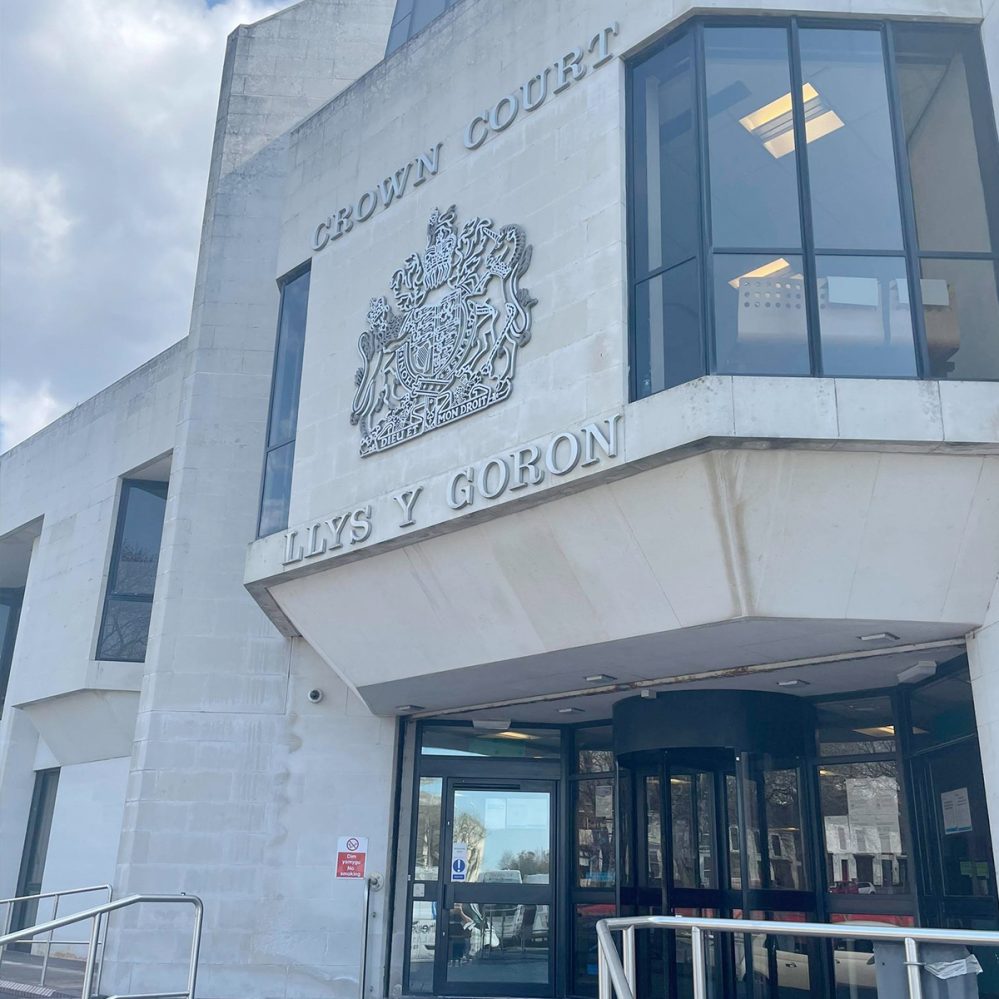
Five masked men smashed their way into property during terrifying late-night raid
A COUPLE feared they were about to be murdered when a masked gang armed with axes burst into their home, a jury at Swansea Crown Court has heard.
Five men dressed in dark clothing and balaclavas forced entry to the property shortly before 9:00pm on May 29, 2021, in what prosecutors say was a planned aggravated burglary. An emergency call was made at 8:51pm.
Prosecutor Mr Wright read to jurors a police statement from homeowner David Davies, who said he had been sitting with his partner, Carmen Bailey, when he heard loud banging at the front door.
“As I got to the entrance, the glass in the door was smashed and the men came through,” he said.
He described five intruders, all carrying axes. One of the men shouted: “Lay face down on the floor.”
Moments later, another voice yelled: “She’s on the phone,” after Ms Bailey contacted police. A further shout of “Let’s go boys” was then heard before the gang fled.
Mr Davies told officers that drawers throughout the property had been opened. Around £3,000 hidden in a spare room was not discovered, but two £50 notes were stolen along with a sanitary item and a Lloyds Bank paying-in book.
He attempted to follow the men as they left and saw the rear of a white SUV. Although his mobile phone had been smashed, it was still functioning.
In a later statement he described one suspect carrying a yellow-and-black rubber-handled axe, adding that another man “hopped out like a kangaroo” as he entered the property.
Ms Bailey said she was left utterly traumatised by the ordeal.
“I was absolutely petrified,” she said. “I felt like I was going to get murdered.”
She told police she could only see the men’s eyes through their balaclavas as she grabbed the house phone and called emergency services. A male voice shouted: “Where’s the money?”
The force of the attack shattered glass up to two metres into the hallway, the court heard.
A third witness, Doreen Jones, said she had phoned Mr Davies during the incident and heard male voices shouting: “Get down, get down.”
The investigation
Jurors were told that a white Nissan Juke — stolen in the Manchester area and fitted with cloned number plates — was later recovered near Paradise Nightclub in Pontardawe after the registration plates had been removed.
Several other men have already pleaded guilty to aggravated burglary, but Mohammed Mills and Michael Quinn deny involvement.
When Mills was arrested, officers recovered £235 in cash and a black iPhone. A vehicle linked to him was searched, leading to the discovery of a machete with an orange handle, black gloves and a balaclava.
Quinn was arrested in November 2021. Officers recovered a gold iPhone and a machete, while a large knife was found under his bed at home. A Nokia handset seized from him contained very little data, most of which had been deleted.
Automatic number plate recognition (ANPR) cameras placed vehicles linked to the defendants in the Bryncethin area at 6:40pm. Both vehicles were later seen at McDonald’s in Morriston at 7:35pm and at a Tesco service station at 8:32pm — around twenty minutes before the burglary.
There is no CCTV footage of the break-in itself.
The prosecution case
The prosecution allege the burglary was carefully planned, including what they describe as a “dry run” the previous day. They say the vehicles travelled together from Manchester and that the meeting in the area had been pre-arranged.
Jurors were told telecommunications evidence, including phone activity and satnav data, places devices linked to the defendants in relevant locations.
The defence
Mills claims he had recently started taxi work and was paid to drive men to Wales, saying he did not know their intentions. He denies wearing a balaclava and says the machete recovered was not his. His barrister told the court he cooperated fully with police and provided access to his phone.
Quinn maintains he travelled to Wales to sell his Vauxhall Insignia and denies any knowledge of the burglary. He says the knife found under his bed was used for dismantling furniture.
The judge reminded jurors that emotion must play no part in their deliberations and that the verdict is theirs alone.
The trial continues.
News
NRW invites feedback on draft decision to issue Withyhedge landfill permit variation
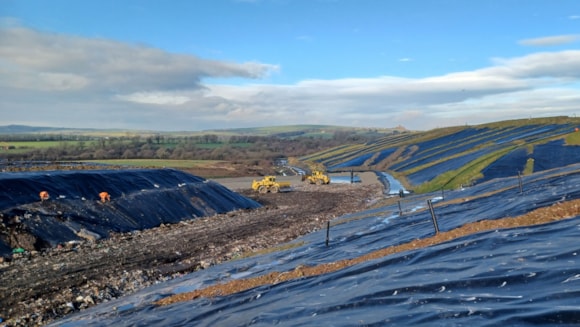
NATURAL RESOURCES WALES (NRW) is seeking public feedback after reaching a draft decision to approve changes to the environmental permit for the Withyhedge Landfill site in Pembrokeshire.
Following what it described as a detailed technical assessment, NRW said it is “minded to” grant a permit variation requested by the site operator, Resources Management UK Ltd. The variation would amend the environmental permit that controls how the site operates (permit number EPR/MP3330WP, application reference PAN-025929).
A four-week public consultation has now opened and will run until Thursday, March 26, 2026. NRW said all responses will be considered before any final decision is made.
The operator is proposing several changes, including alterations to the final shape of the land once the landfill is capped, updates to monitoring and management arrangements for groundwater, surface water and leachate, and the addition of up to 50,000 tonnes of waste soils for restoration purposes under a new waste recovery activity.
The application also includes consolidation and modernisation of the permit, including a review of existing improvement and pre-operational conditions.
NRW said it considers the proposed changes acceptable and believes they could help ensure the site operates without causing harm to the environment or nearby communities.
Residents are being encouraged to provide feedback on issues such as emissions, potential health impacts, environmental risks and how waste is managed at the site.
However, NRW stressed that certain matters fall outside its remit and cannot be considered as part of the consultation. These include planning issues handled by the local authority, such as the site’s location, traffic levels, visual impact, land use, access arrangements and operating hours.
Huwel Manley, Head of South West at Natural Resources Wales, said: “We know the community has a long-standing interest in what happens at Withyhedge Landfill, and we take that responsibility seriously.
“Given the history of the site and the concerns people have previously raised, we promised to take an approach that goes further than our usual consultation process for a permit variation.
“Being ‘minded to’ issue this variation means our specialists are satisfied the operator can meet the required standards, but before we make any final decision we want to hear from the people who live and work nearby. We encourage anyone with an interest in the site to take part in the consultation.”
Details of the draft decision and information on how to submit comments are available via NRW’s Consultation and Engagement Hub.
-

 News6 days ago
News6 days agoLabour and Plaid criticised over £1.2m anti-racism ‘metaverse’ project
-

 Charity7 days ago
Charity7 days agoCharity launches bid to save Foley House with new community cooperative
-

 Crime7 days ago
Crime7 days agoEleven-year jail term for rape after judge finds victim ‘particularly vulnerable’
-

 Health6 days ago
Health6 days agoHealth services row escalates as MSs demand action over Withybush and Bronglais
-

 Crime7 days ago
Crime7 days agoHaverfordwest man guilty of raping his own sister
-
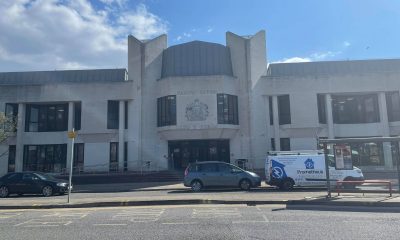
 Crime7 days ago
Crime7 days agoMerlins Bridge man denies six child sex assault charges
-

 Crime7 days ago
Crime7 days agoMan who threatened to kill Herald editor given suspended prison sentence
-

 Politics6 days ago
Politics6 days agoFarage vows to strip Cardiff’s ‘City of Sanctuary’ status ahead of manifesto launch












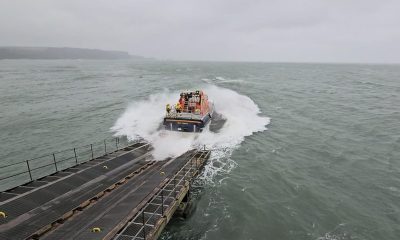









Colin canton
April 27, 2020 at 11:28 am
Our children should have an understanding that all innocent victims of war are equal, this type of thing is a clear attempt to create an hierarchy in victimhood with a political agenda and should not be allowed